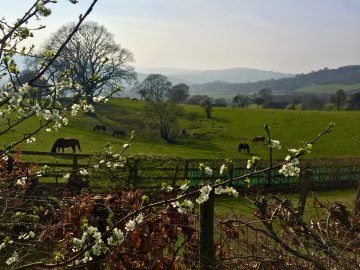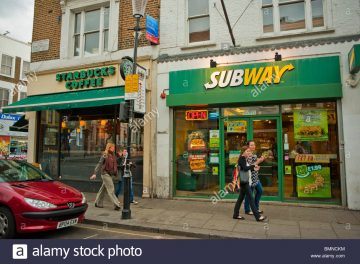by Emrys Westacott
 Just as Anteus in Greek mythology renewed his strength by touching the earth, so emigrés who live abroad often draw some sort of cultural or spiritual nourishment from returning to their roots. In my case this means returning to Britain, and specifically to the countryside that remains, for the most part, green and pleasant. Usually I do this in the summer, so it made a nice change this year to be in Britain at the beginning of Spring. The trees not yet being in leaf left more of the landscape open and visible. There were fewer flowers, of course, but there were also fewer holiday makers clogging up the roads and the honey pot tourist sites.
Just as Anteus in Greek mythology renewed his strength by touching the earth, so emigrés who live abroad often draw some sort of cultural or spiritual nourishment from returning to their roots. In my case this means returning to Britain, and specifically to the countryside that remains, for the most part, green and pleasant. Usually I do this in the summer, so it made a nice change this year to be in Britain at the beginning of Spring. The trees not yet being in leaf left more of the landscape open and visible. There were fewer flowers, of course, but there were also fewer holiday makers clogging up the roads and the honey pot tourist sites.
The British countryside, especially the Derbyshire Peak District (full disclosure–it’s where I grew up, and I’m biased), is simply fabulous for its combination of natural beauty, historical interest, scientific significance, variety and accessibility. When out walking, the superb large-scale ordinance survey maps–now available as a phone-app– are indispensable aids and do much to enhance the experience. I never fail to be amazed at how, in spite of there being over sixty-five million people crammed onto a small island, one can so easily enjoy in virtual solitude fields and hillsides, rivers and streams, woods and moorlands. One sunny afternoon I walked out onto a moor just a few miles East of greater Manchester, and in three hours met no-one.

The towns and cities, though, are a different matter. Of course, many contain much that is engaging and admirable: fine parks; some beautiful buildings; and many places of historical significance. But in many cities it is now common for elegant old buildings of historical significance to be hemmed in and frequently dwarfed by recent constructions that clash jarringly with them. In many cases the more modern buildings are bluntly functional–multi-story car parks, office block cubes, cloned pre-fabs–with all the charm of a traffic bollard. But even when contemporary architecture is interesting and expressive, the intrinsic aesthetic merits of a building will frequently be offset by the unfortunate effect it has on its neighbours.
The growing homogeneity of town centres in Britain is also rather depressing. As corporate supermarkets, hardware stores, garden centres, and the like suck business to the peripheries, small local shops go under and are replaced by familiar restaurant chains. Pedestrian precincts in city centres were an excellent idea that made shopping and strolling there much more pleasant. But homogenization has rendered them rather boring: Starbucks, Subway, Boots, W.H. Smith, Oxfam, Costa, McDonalds, KFC, Starbucks……. One could be anywhere.
But homogenization has rendered them rather boring: Starbucks, Subway, Boots, W.H. Smith, Oxfam, Costa, McDonalds, KFC, Starbucks……. One could be anywhere.
Typically, I arrive in England flying from the West into Heathrow and then take the Piccadilly line to central London. Three things invariably strike me at this time.
First, the lovely green landscape West of London, prettily divided into small fields separated by hedges, dotted with bits of woodland, and brick houses.
Second, the infuriating amount of noise pollution in the airport and on the underground. Obviously, an airport is not the place to go if one desires peace and quiet. But someone in authority ought to ask if the unrelenting reminders to not leave bags unattended, to report anything that look suspicious, etc. really serve a purpose. In my head, and I assume in everyone else’s too, they just merge with all the other announcements and annoying airport noises into an undifferentiated wall of sound.
Even more infuriating, though, is the stream of verbiage one is subjected to on the underground. I didn’t take exact notes, but in my memory it seems to go something like this.
“This is the Piccadilly line train to Cockfosters. The next stop will be Hounslow West. Please stand clear of the doors. Please mind the gap between the train and the platform. This is Hounslow West. Please mind the gap. Mind the gap, mind the gap, MIND THE GAP. Please stand clear of the doors. This is the Piccadilly line train to Cockfosters. The next stop will be Housnslow Central. Please mind the gap between the train and the platform. Mind the gap, mind the gap…………”
I’ll admit it makes sense to announce the name of the station that one is arriving at. But the rest seems to be just noise pollution, designed, I suspect, to prevent passengers from reading anything more challenging than a tabloid newspaper.
Excessive and pointless announcements are hardly unique to Britain, of course. The pilot on the Norwegian Air flight on which I eventually flew out of London was one of those who simply wouldn’t shut up. After advising us to just sit back and enjoy the flight, he felt it necessary to tell us what sort of paperwork he still needed to complete before take-off, where we were in the take-off queue, which airlines were in front of us, how fast we’d be flying, the current weather conditions in Boston, and so on and so on. Most of this is verbal littering. There should be a law!
And speaking of litter, that is the third thing I always notice on arriving in Britain: the litter. It’s especially bad around train lines, presumably because these are often on lower-lying ground between slopes, fences or walls, and therefore become the natural final-resting place for a huge quantity of trash–and it appears that no-one is employed to clean things up. It’s a shame that the first impression so many visitors to Britain receive is of this particularly trash-ridden, neglected, and shabby part of the urban landscape.
It’s especially bad around train lines, presumably because these are often on lower-lying ground between slopes, fences or walls, and therefore become the natural final-resting place for a huge quantity of trash–and it appears that no-one is employed to clean things up. It’s a shame that the first impression so many visitors to Britain receive is of this particularly trash-ridden, neglected, and shabby part of the urban landscape.
Sadly, though, this first impression is not exactly misleading. The amount of litter on streets, alleyways, paths, and parks is quite shocking. Throw in a fair amount of unscooped dog muck and the spectacle can become quite disgusting. Exactly why Britain should be so litter-ridden, though, is hard to fathom. There have been several campaigns over the years to “keep Britain tidy”, but clearly none of them have been very successful. Some say these campaigns fail because their approach is fundamentally flawed. They try to modify people’s behavior through propaganda; but the problem is structural and institutional. We live in the age of disposable items, large and small. So much of what we buy is made to be discarded, it should be no surprise to see plastic bottles and Styrofoam trays everywhere.
This argument is plausible.But an obvious objections to it is that there are many other countries that equally traffic in disposables but which are relatively litter-free: e.g. Switzerland, Norway, New Zealand, Germany, Canada. The question one has to ask, therefore, is why a much higher percentage of the population in Britain sees nothing wrong with throwing litter down in a public space? The answer has to lie in the general culture. Children in British schools are undoubtedly taught not to litter, and as mentioned earlier, various governments have tried, rather half-heartedly, to address the problem. But evidently, many people just don’t view littering in public places as fouling their own nest. And this, one assumes, has to do with fairly deep attitudes concerning the relation of the individual to society.
Compared to any of the countries mentioned above, Britain has pursued neo-liberal policies which tend to foster individualistic as opposed to communitarian attitudes. Margaret Thatcher, who spearheaded the neo-liberal transformation of Britain, famously remarked that “there is no such thing as society. Things are connected. According to the neo-liberal outlook, the freedom of the individual–which rather perversely is usually interpreted to include corporations–should be prioritized over other interests. So if a developer wants to put up an eye sore that uglifies a street, that’s their right. If global chains like Starbucks want to squeeze out local establishments, so be it. I’m not suggesting that Britain’s litter problem is entirely due to this philosophy becoming prevalent; there are presumably other complicated historical, economic and cultural causes. But it is reasonable to see it as an important contributory factor.
Strange, that people should treat public space so badly in a country whose greatest blessing lies in its beautiful and accessible public spaces.
